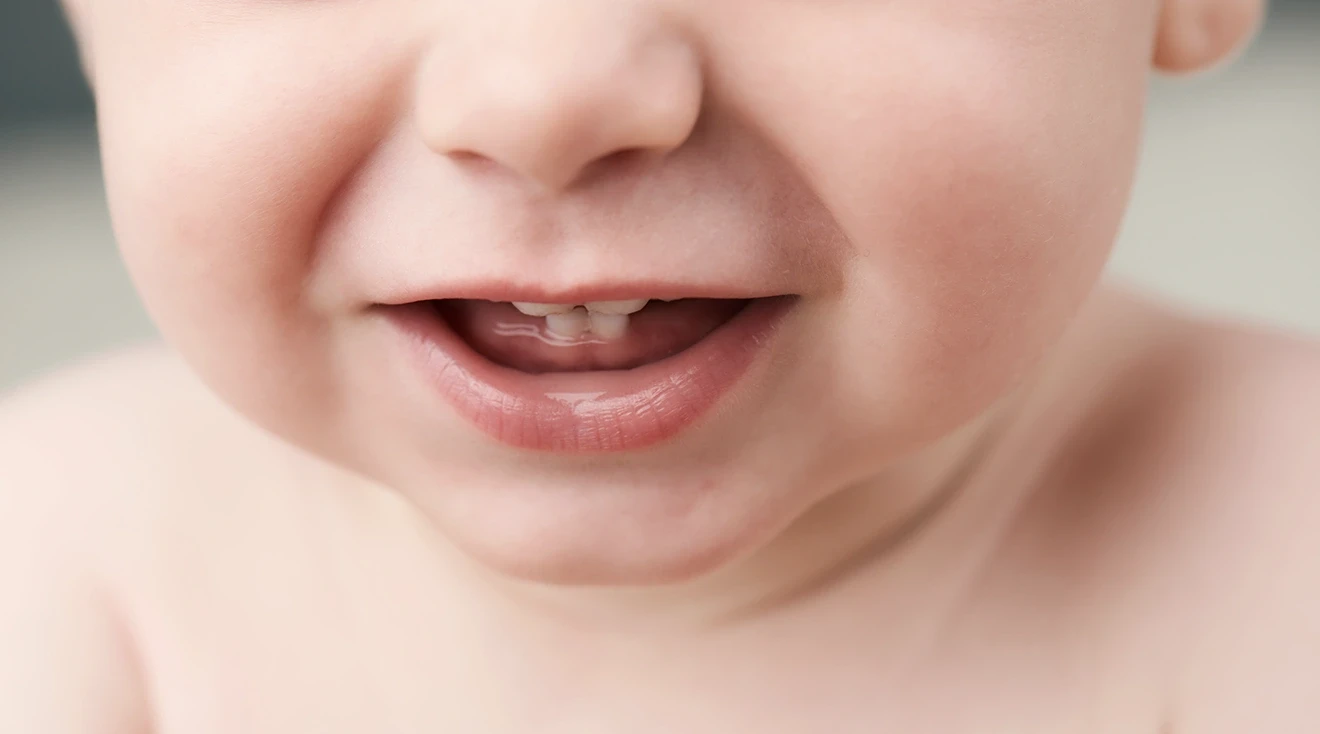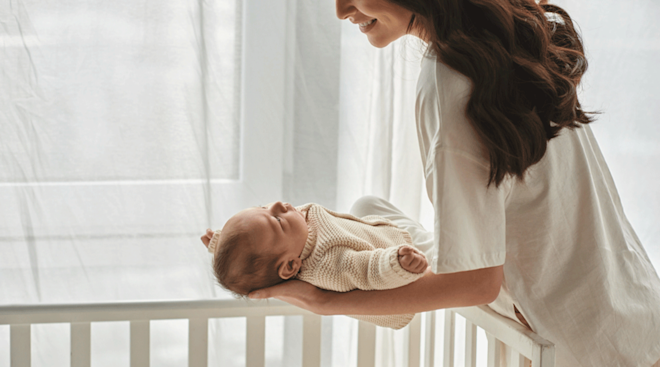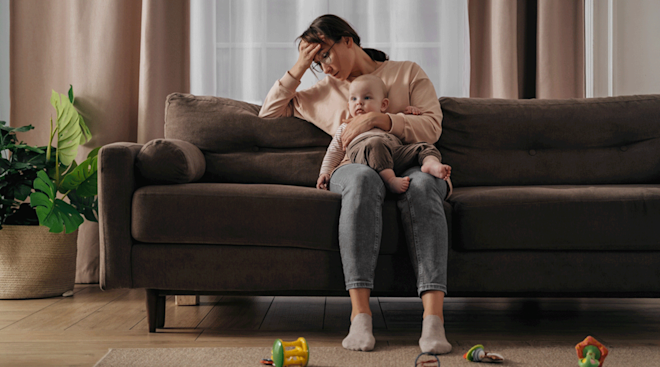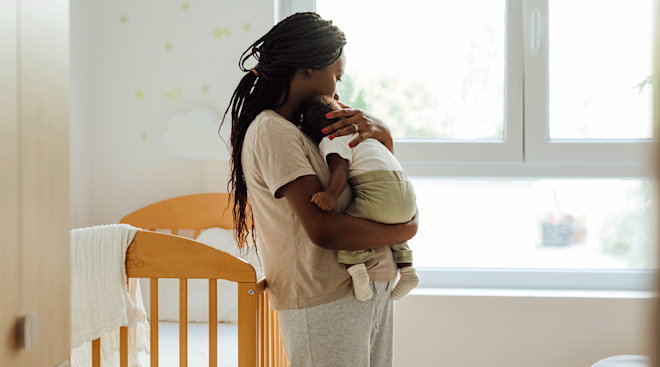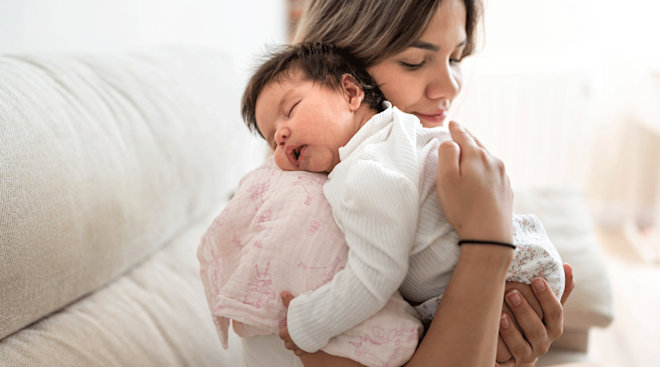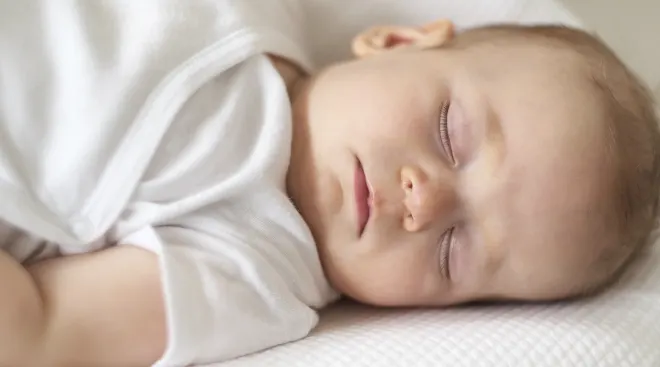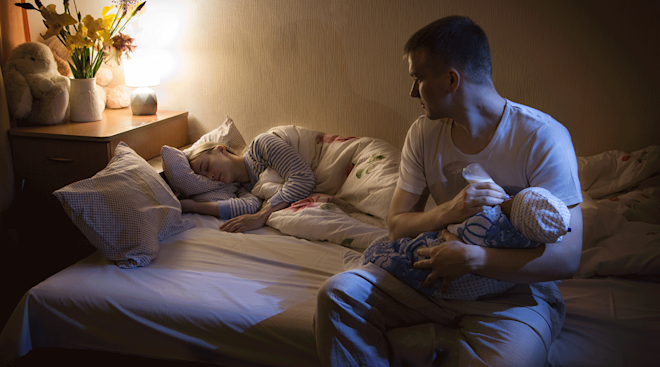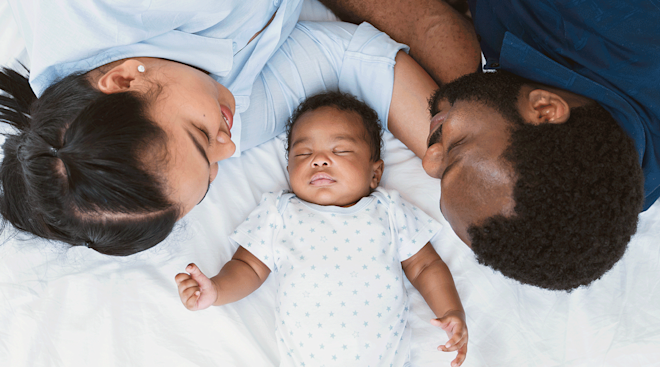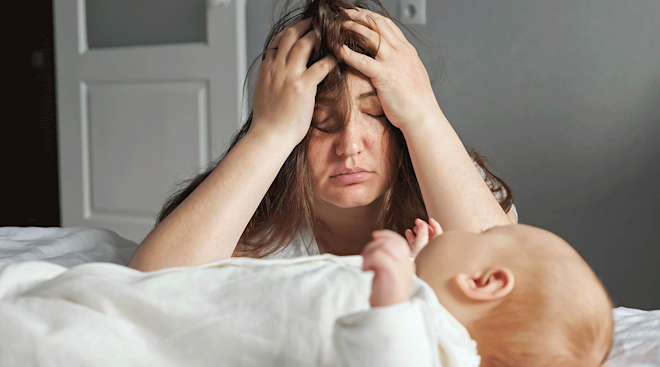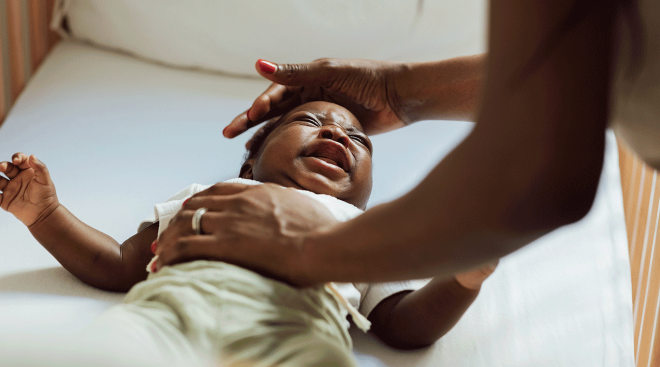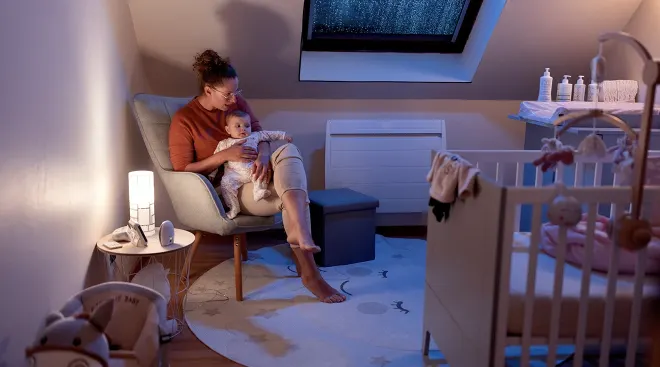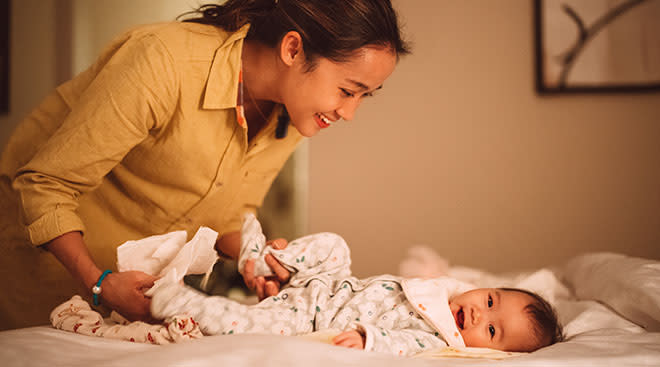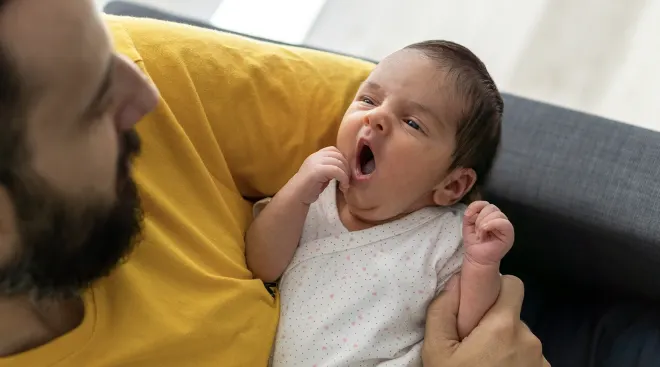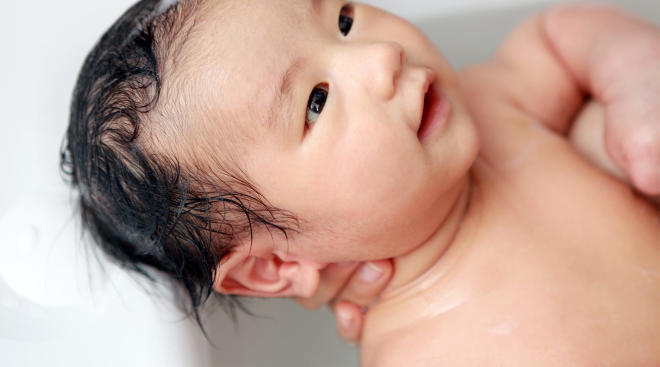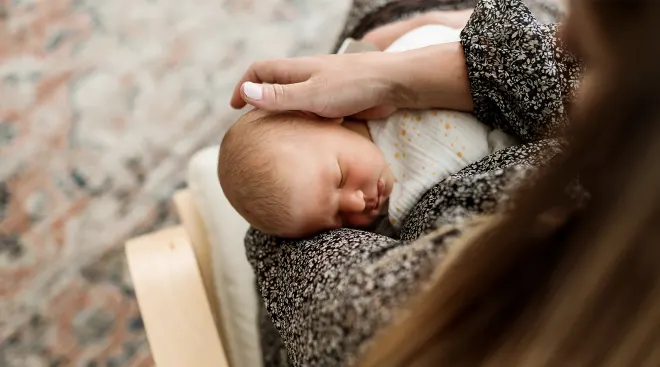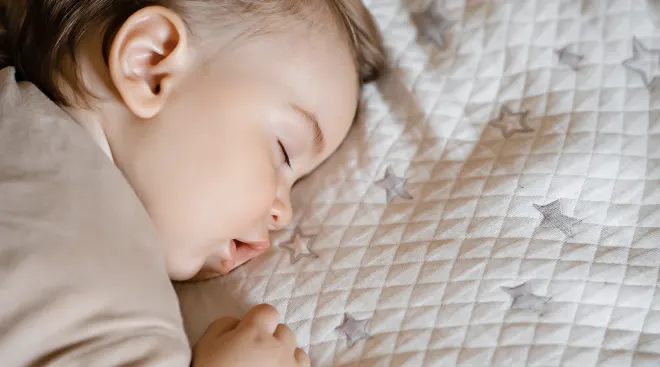Everything You Need to Know About Baby Grinding Their Teeth
Just as some adults unconsciously grind their teeth while sleeping, some babies do too—so don’t be surprised if you hear a slight squeaking or subtle grinding noise in your little one’s nursery after they’ve nodded off for the night. But why do babies grind their teeth—and should you be concerned? While baby teeth grinding may take you by surprise, it’s completely normal and common. Keep reading to learn more about baby grinding teeth, why it happens and what to do about it.
Babies can start grinding their teeth during sleep within the first year of life, once their first baby teeth come in, says Matthew Harper, DDS, FRCD©, an associate in the department of dentistry at Boston Children’s Hospital. However, it more often starts around the time baby develops a stable bite, between the ages of 2 and 3. “Teeth grinding usually stops on its own by the age of 6 years old, but some children may continue to grind their teeth into adolescence,” adds Ashley Lerman, DDS, a board-certified pediatric dentist at Firstgrin.
There are two different types of grinding—also known bruxism—in kids: sleep bruxism and awake bruxism. Up to 49 percent of kids experience sleep bruxism, says Harper. It’s less common for babies to grind their teeth while awake, but it does happen.
Unfortunately, experts aren’t entirely sure why babies grind their teeth. “The cause is likely multifactorial,” Lerman says. It’s also important to note there’s lots of conflicting evidence on what exactly causes teeth grinding in kids. Below, some of the most potential causes, according to experts:
-
Ear-nose-throat illnesses: According to a 2023 study, ear-nose-throat (ENT) issues, as well as mouth-breathing, were found to increase the chances of baby grinding teeth while sleeping. A 2014 study also found a correlation between bruxism in kids and respiratory problems. However, Lerman warns there’s conflicting evidence for whether babies grind teeth more when they’re sick. “The evidence suggests that there may be some association between babies grinding teeth and illness or discomfort, but the relationship isn’t well understood and requires further research,” she says.
-
Improperly aligned teeth: Baby grinding teeth can be a result of improperly aligned teeth, the AAP notes. Pacifiers and thumb sucking are common culprits of misaligned teeth in older toddlers and preschoolers, and a 2023 study found that both were associated with an increased risk of babies and toddlers grinding teeth.
-
Pain: Johns Hopkins Medicine and the AAP cite pain from teething as another potential cause of teeth grinding. They do it reflexively to help ease some of the discomfort they’re feeling.
-
Sleep disordered breathing: Lerman says sleep-disordered breathing is another plausible cause of bruxism in kids. As a 2020 study explains, obstructed airways during sleep can signal the jaw to slide forward to help airflow. According to a 2007 study and Lerman, sleep-disordered breathing—which can result in sleep apnea—affects up to 25 percent of young children.
-
Stress, anxiety and hyperactivity: According to the AAP and American Academy of Sleep Medicine, stress and anxiety could be another contributing factor to children grinding teeth. A 2015 study backs this up and found that kids with sleep bruxism had higher levels of anxiety than kids without. Johns Hopkins Medicine notes that hyperactivity issues, such as ADHD, may also play a role.
-
Family history: A 2016 study found a correlation between genetics and bruxism in kids. Another 2018 study noted that children were more likely to grind teeth if their biological moms did.
According to Harper, issues such as gastroesophageal reflux, genetics and socioeconomic status may also play roles in babies grinding their teeth. Plus, previous studies have found that sleep bruxism may be more likely in children with increased screen time, excessive sugar consumption and exposure to secondhand smoke. Needless to say, there’s much more research needed to figure out exactly why babies grind teeth.
Bruxism doesn’t happen until baby’s teeth come in, so it can happen to any teeth, depending on baby’s unique bite. That said, young children typically grind their baby molars (back teeth) and their canine teeth the most. “[This] may be due to the fact that primary molars are larger and stronger than primary incisors and are therefore better able to withstand the forces of grinding,” Lerman says. “Additionally, primary molars are often the teeth that are erupting or being shed during the toddler and preschool years, which may contribute to the tendency to grind them.”
Wondering how to tell when baby’s grinding their teeth? According to the AAPD, parents may be able to hear a squeaky grating or grinding noise from baby’s room while they’re asleep. They may also hear baby clenching their jaw, which usually goes hand-in-hand with babies and toddlers grinding teeth. “The outcome is similar to grinding,” says Lauren Crosby, MD, FAAP, a pediatrician based in Beverly Hills, California. “Clenching can also cause jaw pain [and] tooth damage. But similar to grinding, it typically doesn’t have lasting effects and kids outgrow it.”
While you may be able to hear baby teeth grinding, only a pediatric dentist can accurately diagnose it. Baby teeth grinding can cause wear and loss of structure in the affected teeth over time, Lerman says.
Some clinical signs of babies grinding teeth include flattened, worn, dull or shiny areas on the tops of the teeth, as well as teeth chips and fractures. These symptoms often come from persistent and frequent teeth grinding. More limited signs of wear on baby’s teeth doesn’t necessarily indicate bruxism, Harper says, explaining that tooth wear is more intense in baby teeth because they have a thinner layer of enamel. If you’re unsure whether baby is grinding teeth at night, reach out to your pediatrician for personalized guidance.
Since teeth grinding tends to stop before children get their permanent teeth in, it’s unlikely to cause any lasting damage. That said, it’s still a good idea to reach out to your pediatrician in the event of:
- Pain in their jaw or teeth
- Complaint of headaches
- Changes in their bite or alignment of the teeth
- Difficulty eating, speaking or opening their mouth
- Excessive sleepiness or crankiness during the day
- Snoring or pausing while breathing during sleep
- Developmental delays or behavioral issues
- Sensitivity to hot, cold or sweet foods and drinks
- Chipped or cracked teeth
- Worn down tooth enamel
If baby’s teeth grinding is pointing to an underlying issue, they may require additional evaluation.
Because kids outgrow bruxism, there’s usually nothing parents need to do, Crosby says. But if you’ve already confirmed there aren’t any serious underlying issues, and you’re wondering how to stop baby from grinding their teeth, try the following tips:
-
Manage baby’s pain levels: Crosby recommends offering a teething toy to soothe any potential pain. “If it seems like the jaw is sore, warm compresses or the occasional use of Tylenol or nonsteroidal anti-inflammatories (such as ibuprofen) might be recommended," she adds. Of course, always check with your pediatrician first, as some over-the-counter pain relievers aren’t recommended for babies under 6 months.
-
Manage stress levels: Create a consistent and relaxing environment before bedtime, Lerman advises. Also try things that promote stress relief, like baby massage, white noise and story time.
-
Build good sleep habits: You’ve heard this one time and time again, but establishing good sleep hygiene early on gives baby a healthy start. “Poor sleep quality or quantity can contribute to teeth grinding in children,” Lerman says. Set baby up for success by following a consistent bedtime routine.
-
Promote healthy oral habits: “A direct relationship may exist between oral habits and sleep bruxism,” Harper says. These include biting lips, nails and the inside of the cheek, as well as long-term use of pacifiers and thumbsucking. Helping baby eliminate these oral habits may decrease their risk of sleep bruxism.
-
Have baby eat a balanced diet: Ensure baby eats a balanced diet full of calcium and magnesium, “which are important for healthy teeth and muscles,” Lerman says. While it may not directly reduce baby’s teeth grinding, a nutritious and balanced diet will help boost their overall health.
In adults, teeth grinding is often treated with a mouthguard, however oral appliances generally aren’t recommended for young children. “They can change teeth alignment or hinder the growth of teeth,” Crosby says. As your child gets older, talk to a pediatric dentist about mouthguards kids can wear during sports and other contact activities (as these activities could negatively impact already worn-down teeth).
Baby grinding teeth at night can be startling for parents, but take heart knowing it’s a common habit among little ones—and one they’ll likely outgrow soon.
Please note: The Bump and the materials and information it contains are not intended to, and do not constitute, medical or other health advice or diagnosis and should not be used as such. You should always consult with a qualified physician or health professional about your specific circumstances.
Plus, more from The Bump:
Lauren Crosby, MD, FAAP, is a pediatrician with La Peer Pediatrics in Beverly Hills, California, as well as a mom of two. She earned her medical degree from UCLA School of Medicine and completed her residency at Cedars-Sinai Medical Center. She currently serves as an official spokesperson for the American Academy of Pediatrics.
Matthew Harper, DDS, FRCD(C), is a pediatric dentist and member of the American Academy of Pediatric Dentistry. He currently serves as an associate in the department of dentistry at Boston Children’s Hospital, as well as a professor of developmental biology at Harvard School of Dental Medicine. He earned his dental degree from the University of Western Ontario located in Canada.
Ashley Lerman, DDS, is a pediatric dentist and the founder of Firstgrin, which provides personalized oral care boxes to help caregivers focus on dental health for their young age. She received her bachelor's degree from the Rensselaer Polytechnic Institute and earned her doctorate of dental surgery from Columbia University College of Dental Medicine.
Journal of Clinical Medicine, Sleep Bruxism in Children—What Can Be Learned from Anamnestic Information, April 2023
Indian Journal of Dental Research, Association between respiratory problems and dental caries in children with bruxism, February 2014
Healthy Children (American Academy of Pediatrics), Teeth Grinding in Children, September 2013
Johns Hopkins Medicine, Johns Hopkins All Children's Hospital For Patients and Families
Biomedical Informatics, Impact of airway dysfunction on dental health, January 2020
Sleep, Sleep Disordered Breathing And Daytime Sleepiness Are Associated With Poor Academic Performance In Teenagers. A Study Using The Pediatric Daytime Sleepiness Scale (PDSS), December 2007
American Academy of Sleep Medicine, Children who grind their teeth are more likely to have problems in school, be withdrawn from others, June 2008
Brazilian Oral Research, Sleep bruxism and anxiety level in children, January 2015
Sleep, Sleep Bruxism-Tooth Grinding Prevalence, Characteristics and Familial Aggregation: A Large Cross-Sectional Survey and Polysomnographic Validation, November 2016
Sleep Science, Relationship between stress and sleep bruxism in children and their mothers: A case control study, August 2018
Sleep Medicine: X, Sleep bruxism in children: relationship with screen-time and sugar consumption, December 2021
BMJ Journals, Association between exposure to secondhand smoke and sleep bruxism in children: a randomised control study, June 2012
American Academy of Pediatric Dentistry, Bad-Habit Rehab, June 2010
Learn how we ensure the accuracy of our content through our editorial and medical review process.
Navigate forward to interact with the calendar and select a date. Press the question mark key to get the keyboard shortcuts for changing dates.

































